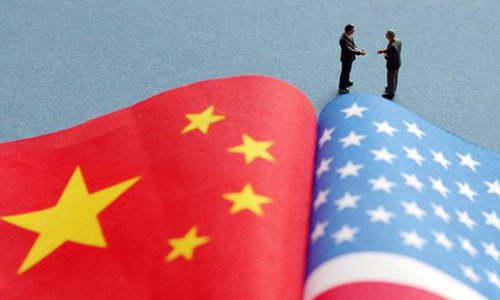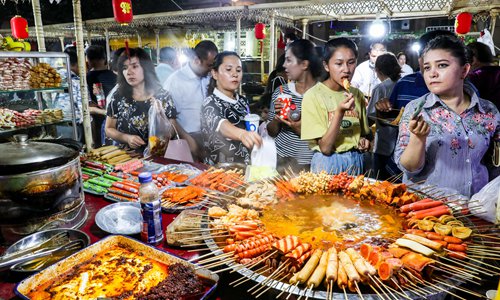China opposes US blacklist
By Huang Ge and Song Lin Source:Global Times Published: 2019/10/8 23:53:40
Typical trade talk tactics of Trump administration: expert

Chinese and US trade officials make attempt at striking a trade deal to defuse an increasingly bruising trade war that has rattled global markets and presented mounting challenges to both economies. Photo: VCG
A US decision to blacklist 28 Chinese entities, which was announced shortly before high-level Chinese and American officials meet in Washington for a new round of trade talks, is typical of the Trump administration's trade talk tactics and showed the US was seeking to benefit by further pressuring China, Chinese experts warned on Tuesday.
China is prepared to counter, they noted, with its own unreliable entity list.
The US said on Monday (US time) that it had added 28 Chinese organizations to a blacklist due to concerns over their roles in human rights violations in Northwest China's Xinjiang Uyghur Autonomous Region, alleging they were involved in "carrying out China's campaign of repression, mass arbitrary detention and high-technology surveillance," the New York Times reported, citing the US Commerce Department.
The Xinjiang Public Security Bureau and 19 smaller government agencies were named on the blacklist. The list targeted eight companies that focus on facial-recognition and artificial intelligence (AI) technology including Hikvision, Megvii Technology, iFlytek Co and SenseTime.
The move prevents the Chinese entities from buying US products.
As of press time, several related Chinese companies expressed strong opposition toward the block, saying such a move lacked factual basis and would eventually harm US economic interests.
"Hikvision respects human rights and takes our responsibility to protect people in the US and the world seriously," a corporate spokesperson was quoted as saying in a statement sent to the Global Times.
The move will hamper efforts by global companies to improve human rights around the world, Hikvision said, noting that punishing Hikvision will deter global companies from communicating with the US government, hurt Hikvision's US business partners and the US economy.
Megvii Technology also strongly objected to the move, saying that the ban came "without any factual basis."
"We strictly stick to policies regarding data privacy and security," the firm said, noting that "We abide by all relevant laws and regulations of the jurisdictions in which we operate."
The move is typical of the Trump administration's tactics for trade talks - negotiations plus sanctions, aiming to seek more during bilateral discussions," said Ma Jihua, a veteran industry analyst.
This time, the US applied the excuse of human rights violations against ethnic groups in Xinjiang as they meet the preference of some anti-China forces in the US, said Gao Lingyun, an expert at the Chinese Academy of Social Sciences.
Such a move indicated that Washington wants to show it holds several leverages more than just economic and trade cards to confront China, said Gao, noting that the US was likely to further pressure China on more aspects to pursue its interests.
Experts said the US accusations are baseless and the technology developed by the firms was not involved in human rights breaches. "The development of high technology such as facial recognition and AI will help improve the level of city management and social governance and this is a necessary development trend not only in China, but also around the world," said Ma.
"Behind the political purpose, the US also hopes to suppress the technological advantages of these Chinese companies," said Ma.
Limited effect
Ma noted that these Chinese tech firms will be affected in a limited manner as they have seen some previous cases and made preparations during the year-long trade war initiated by the US.
Inclusion on the list will not have a significant impact on the daily operations of iFlytek, the firm said, adding that it has "plans for this situation."
Meiya Pico, which is also on the list, said the main supporting hardware products purchased by the company are replaceable and most of its suppliers and clients are from China. Overseas sales accounted for no more than 1 percent of the firm's total revenue.

Residents taste snacks at a night market in the old town of Kashgar, northwest China's Xinjiang Uygur Autonomous Region. Photo: Xinhua
Strong objection
The latest decision by the US to blacklist 28 Chinese entities showed President Donald Trump administration's continuous attempts to pressure China as the human rights violation accusations totally distort the truth, Chinese experts said, adding that the ban only further exposed US interference in China's anti-terrorism efforts and attempts to contain China's development.
China on Tuesday strongly opposed the US decision, saying such a move violates the basic norms of international relations and interferes in the country's internal affairs.
Xinjiang's affairs are China's internal affairs and no country has the right to interfere, and there are no such so-called "human rights issues" as claimed by the US in Xinjiang, Geng Shuang, spokesperson for the Foreign Ministry, told a press conference.
The counterterrorism and de-radicalization measures adopted by the local government in Xinjiang aim to prevent extremism and terrorism, which is fully in line with Chinese laws as well as international practices, Geng said.
He noted these practices were widely supported by 25 million people of all ethnic groups in Xinjiang and have also made a positive contribution to the international counter-terrorism cause.
"We strongly urge the US to immediately stop making irresponsible remarks on Xinjiang, stop interfering in China's internal affairs and move relevant Chinese entities out of the list," China's Ministry of Commerce said Tuesday night.
China will also take all necessary measures to resolutely safeguard its own interests, the ministry said.